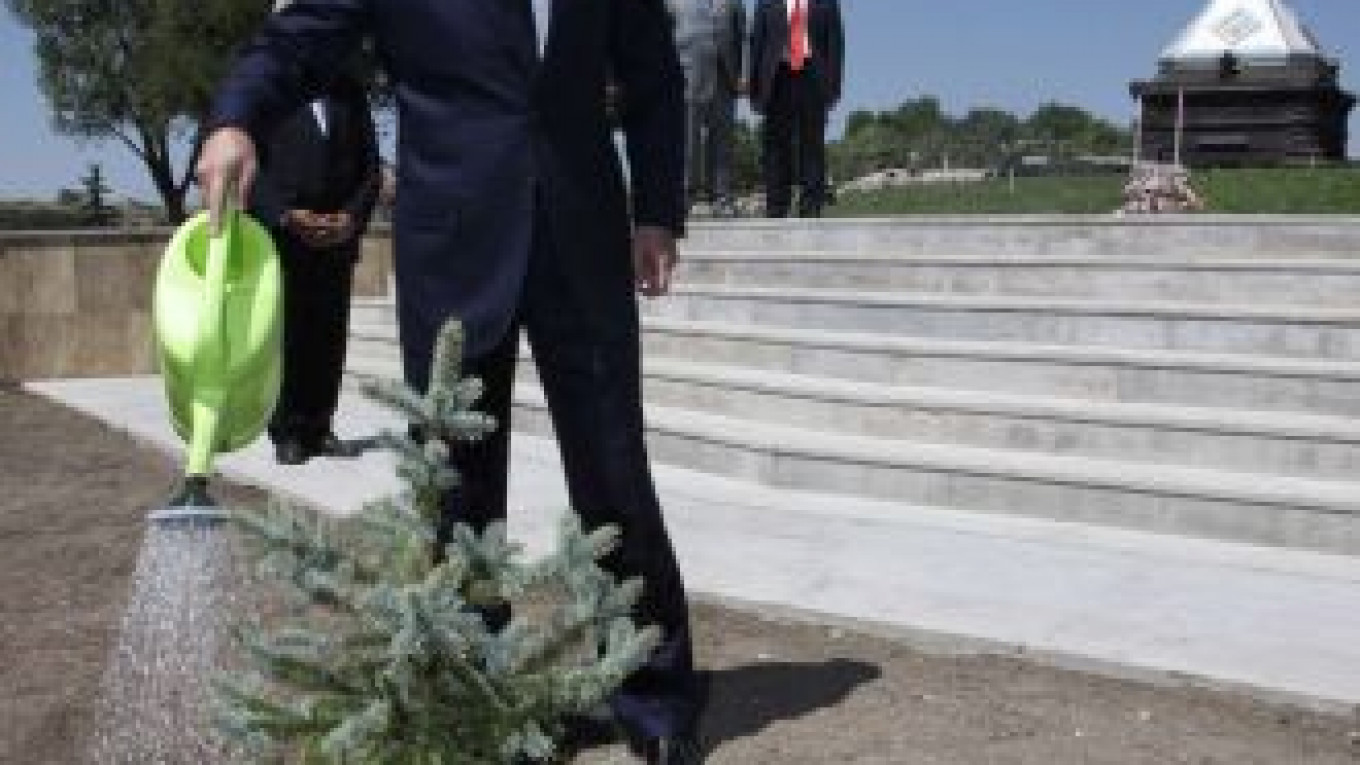YEREVAN, Armenia — President Dmitry Medvedev secured a long-term foothold for Russia in the energy-rich and unstable Caucasus region Friday by signing a deal with Armenia that allows a Russian military base to operate until 2044 in exchange for a promise of new weaponry and fresh security guarantees.
"The protocol doesn't just allow the Russian military base to stay in Armenia for a longer period, it also extends the sphere of its geographic and strategic responsibility," Armenian President Serzh Sargsyan said after talks with Medvedev.
Russia's base in Armenia has about 5,000 troops along with MiG-29 fighter jets and S-300 air defense missiles, according to Russian and Armenian reports, citing official sources.
Medvedev said the base was intended to "support peace and stability in the southern Caucasus and the entire Caucasus region."
The 24-year extension on the base is part of Moscow's efforts to strengthen its clout in other former Soviet republics, which have worried many of its neighbors. Russia fought a brief August 2008 war with Georgia, which borders Armenia to the north, and tensions have remained high.
"Russia wants to underline its role as the key player in the region," said Sergei Minasian, a Yerevan-based political analyst.
But Russia's clout on former Soviet turf, which Russian leaders have declared a privileged zone of interests, has remained limited. Moscow has run into fierce economic and political disputes with its one-time closest ally, Belarus. Russian and Belarussian leaders have traded barbs and blamed one another for an increasing strain in relations.
Russia also has talked much about raising its influence in Central Asia and has grown increasingly jealous of the U.S. presence there, but it did nothing when the government of Kyrgyzstan asked Moscow to send troops to help put down deadly ethnic violence in June.
After their talks, the Russian and Armenian presidents were joined by other leaders from the Collective Security Treaty Organization, a Moscow-led security alliance of seven former Soviet republics, including Kyrgyzstan and Belarus.
Medvedev said the Kyrgyzstan unrest showed that the CSTO needed to be able to respond more quickly and effectively in crisis situations. He said CSTO leaders agreed to form a plan by the end of the year, and he recommended studying the experience of other organizations such as NATO, the EU and United Nations.
The CSTO, however, failed to agree to provide military aid for Kyrgyzstan, whose interim leadership is struggling to maintain order before landmark parliamentary elections in October.
Kyrgyzstan had asked the CSTO countries to supply hardware and military training. But the CSTO meeting ended without a decision, and Sargsyan said consultations on the issue would continue.
Also Friday, Armenia awarded Russia with a contract to build two new reactors at a Soviet-era nuclear power plant. Construction works on the $5 billion project are expected to start next year.
Medvedev on Friday visited the opening of a memorial in Gyumr to Russian servicemen killed during the Russian-Turkish wars in the 19th century.
(AP, Reuters)
A Message from The Moscow Times:
Dear readers,
We are facing unprecedented challenges. Russia's Prosecutor General's Office has designated The Moscow Times as an "undesirable" organization, criminalizing our work and putting our staff at risk of prosecution. This follows our earlier unjust labeling as a "foreign agent."
These actions are direct attempts to silence independent journalism in Russia. The authorities claim our work "discredits the decisions of the Russian leadership." We see things differently: we strive to provide accurate, unbiased reporting on Russia.
We, the journalists of The Moscow Times, refuse to be silenced. But to continue our work, we need your help.
Your support, no matter how small, makes a world of difference. If you can, please support us monthly starting from just $2. It's quick to set up, and every contribution makes a significant impact.
By supporting The Moscow Times, you're defending open, independent journalism in the face of repression. Thank you for standing with us.
Remind me later.






